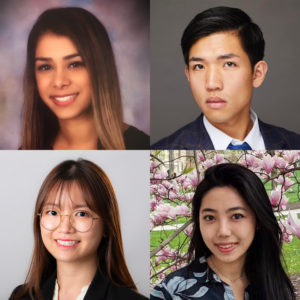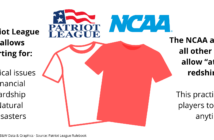
From top left clockwise: Arshia Bhatia, ’18, Bohan Chen, ’19, Christina Qin, ’18, and Ada Tao, ’19, are all international students. Many international students face a variety of challenges when pursuing a career path after college in the United States. (Courtesy Arshia Bhatia, Bohan Chen, Christina Qin and Ada Tao)
Christina Qin, ’18, heard about the struggles of finding a job after graduation in the United States, but didn’t fully understand until she went through the career process.
Qin, who is from Hangzhou, China, is pursuing a degree in industrial systems engineering with a concentration in information systems and a minor in applied mathematics.
It wasn’t until the end of her sophomore summer, after she interned in China, that Qin found her desire to work full time in the U.S.
During her junior year, she attended every event Lehigh offered in the fall recruitment process and applied for many internships but was not successful.
“I didn’t land any sort of interview my first semester of junior year, and I was pretty upset,” Qin said. “I thought I put a lot of effort into it. Being an international student, it was extra hard to land a job or interview.”
Qin is one of the 282 international students graduating May 21.
Lynn D’Angelo-Bello, the associate director of graduate student career development, assists international graduate students in overcoming specific cultural barriers when facing the U.S. job search.
D’Angelo-Bello said she helps students with the application process, completing mock interviews and understanding the nuances of communicating through self-branding with U.S. employers. She said she clarifies U.S. employer expectations and teaches cultural behaviors and conversational patterns to help prepare students for interviews and networking opportunities.
“International students do have some additional challenges in securing a job or internship, mostly because they need to obtain sponsorship from the organization (when searching for full-time employment),” D’Angelo-Bello said.
She said with the immigration policies possibly changing, she has encouraged students to also apply for jobs in Canada.
Morgan Volkart, the associate vice provost of the western region and international recruitment, said as a part of the admissions recruiting process, she discusses the U.S. career path with prospective students.
“I am very transparent in letting them know that while Lehigh offers many avenues for exposing them to practical hands on experiences and networking, they will need to put themselves out there and take advantage of these opportunities more than most students since they have additional hoops to go through as international students,” Volkart wrote in an email.
When an international student receives an internship or accepts a job offer, they go through a special process to ensure their stay in the U.S.
Samba Dieng, the director of the Office of International Students and Scholars, said his office advises students in filling out the necessary paperwork to pursue these opportunities.
Dieng said students who receive an internship during the school year or summer have to apply for Curricular Practical Training, also known as CPT, which allows students to complete an internship related to a specific course they have taken at Lehigh.
Ada Tao, ’19, completed the CPT process with her summer internship at KPMG in Philadelphia.
She said she is one of five international students in the College of Business and Economics who were offered internships as a junior.
Tao said there are many struggles international student who wish to work in the U.S. after graduation face.
“After coming to Lehigh, I learned a lot (of information) from international student friends in grades higher than me,” Tao said. “They said internships are so hard to find especially for international students. I understand because the firm has to do extra work for us — once we have a full-time position they have to hire a lawyer to file the H-1B (visa). They are also worried we might not be able to fully merge into the culture and work with other American employees.”
Dieng said foreign students who are graduating from Lehigh with a U.S. job offer apply for Optional Practical Training, or OPT, which allows students 12 months to pursue a job in their field of study. Students who are in STEM fields can reapply after 12 months to extend their OPT to 24 months.
Dieng said those who are not STEM majors can only stay in the U.S. for one year, and hopefully the employer will help them apply for H-1B visa, a non-immigrant work visa, allowing these students to stay in the U.S. for up to six years. International students can apply for OPT 90 days before graduation, which costs $410.
“Just because students don’t apply for OPT doesn’t always mean that they don’t have any other means to stay in the U.S.,” Dieng said. “Some don’t decide to apply for OPT because they are getting married to a U.S. citizen and the spouse will sponsor them for a green card. Some may have a mother or father who is a U.S. citizen decide to sponsor them and the timing is right, and they might be able to get citizenship through the green card. If they don’t fall into any of these cases, they will typically return (to their home country).”
Dieng said given the current immigration climate, some students feel anxious about what the future holds in applying for H-1B work visas. Tao said she feels uncertain about the future of the H-1B visa due to political changes within the U.S. toward foreign workers.
Similar to Tao, Bohan Chen, ’19, said he had applied to more than 80 internships before landing a summer internship at JPMorgan Chase.
He said the key to his success was feeling comfortable networking. He spoke to alumni in his fraternity and reached out to young international Lehigh alumni.
Chen said international students need to worry about a myriad of concerns before getting hired beyond the fact that domestic students speak fluent English and some international students don’t speak English as well. He believes the cultural differences make it harder to assimilate into the workplace.
“The nature of the status of your visa is also really hard. If you cannot get your H-1B selected why would a firm hire you?” Chen said. “You won’t be able to stay in the U.S. potentially after one year. Plus, the company has to pay money to sponsor you for your H-1B.”
Recently, Arshia Bhatia, ’18, a finance and marketing major, went through the OPT process.
Originally from India, she moved to Scarsdale, New York, when she was in elementary school and then completed high school in Hong Kong. After applying to more than 25 different summer internships, she was offered a position at Bank of America in New York. Her internship led into a full-time offer, and she will work there after graduation.
But Bhatia said finding an internship wasn’t easy.
“Normally, when you fill out an application, one of the first questions they ask you is if you are a U.S. citizen,” Bhatia said. “There were a lot of internships I didn’t hear back from or there were certain companies only accepting U.S. citizens, so I couldn’t apply to them.”
She said when going through the process, she was stressed more about the fact she wouldn’t find a job rather than the fact she was qualified.
“It definitely is a reality you have to get used to that it is not an even playing field because, even if you are qualified, you may not get it because they would have to pay for your visa,” Bhatia said.
Although Qin and Bhatia overcame the challenges they face as international students, they are hoping to be picked in the H-1B visa lottery.
“There is such a wide gap between what people at Lehigh think international students have to do versus what the reality is,” Bhatia said. “I think there needs to be a culture at Lehigh where people can understand what other students are going through. It definitely is a harder process because there is a lot more stress surrounded by it because if you don’t get a job, you have to leave the country, which is a lot more than most Lehigh students have to do if they don’t get a job.”





Comment policy
Comments posted to The Brown and White website are reviewed by a moderator before being approved. Incendiary speech or harassing language, including comments targeted at individuals, may be deemed unacceptable and not published. Spam and other soliciting will also be declined.
The Brown and White also reserves the right to not publish entirely anonymous comments.
1 Comment
Pingback: International graduates in the US talk securing employment - Unlimited Earn Money